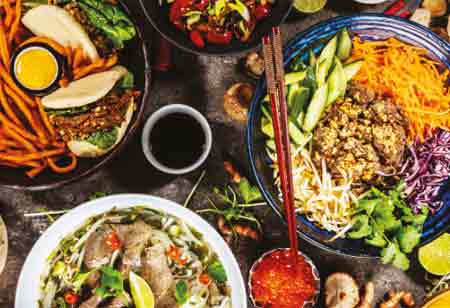Thank you for Subscribing to Construction Business Review Weekly Brief

Local Flavors, Global Standards: The Evolution of Thai Cuisine
Through this article, Steffen Hoffer explores the dynamic growth of Thailand’s food industry, highlighting the contributions of young entrepreneurs, the rise of local and organic products, and the ongoing challenges of sustainable waste management.
Thailand’s food industry has witnessed a remarkable transformation over the past decade, particularly in cultivating and producing highquality local teas, coffees, and cocoa. These exceptional blends now rival European products in flavor and sophistication, with Chiang Rai-based producers like Suwirun and Monsoon leading the charge with their diverse selection of organic teas. This renaissance is fueled by young Thais’ passion and entrepreneurial spirit, creating exciting new opportunities within the food and beverage sector, especially for hotels and restaurants.
Seeing these young individuals pursuing education abroad, gaining valuable expertise, and returning home to establish thriving businesses is truly inspiring. The growing demand for sustainable, locally sourced, organic products creates a fertile ground for their success. These stories echo my early experiences as a commis chef, driven by a vision to push boundaries.
From organic teas to innovative cheeses, young Thais are redefining the country’s culinary landscape, blending tradition with a passion for sustainability
Two individuals exemplify this new wave of Thai culinary innovation. Mr. Jart of Jartisan, a local cheese producer from Chiang Mai, has achieved remarkable success through his dedication to quality and consistency. Similarly, Miss Pim, a former pastry chef, now cultivates a thriving vegetable and fruit farm in Hua Hin. Their impressive product ranges often surprise those who taste them, demonstrating the remarkable potential of Thai-made goods.
Many local businesses have embraced environmentally conscious practices, opting for recyclable packaging. However, challenges remain. Mass-produced items like juices and milk often rely on single-use plastic containers, and the current cost of implementing a recycling return system usually outweighs the expense of producing new containers.
While many five-star hotels have adopted and achieved sustainability standards aligned with GSTC and local guidelines—including waste separation and recycling, EM production, and wastewater treatment for garden use—these efforts are often confined to their properties.
A comprehensive, nationwide waste management system remains a critical need. While plastic, paper, glass, and cans are collected for recycling, and kitchen waste and used oils often find their way to pig farms, the fate of other waste is less specific. Collected by local garbage trucks, this remaining waste is frequently transported to unknown locations, where it may be burned or buried.
Private households currently lack access to a formal recycling system, and while informal sorting by local recyclers exists, it often leads to scattered trash and litter. The scarcity of public trash bins further complicates responsible waste disposal.
Thailand’s beauty and abundant resources offer immense potential for business growth. With hard work, passion, and dedication, the possibilities are endless. One key area for improvement, however, is English language education. Compared to neighboring countries like the Philippines, India, and Malaysia, many Thai youths face a disadvantage due to limited English proficiency. Investing in stronger English language skills would unlock even more excellent opportunities and contribute to a brighter future for all.








